This page curates recent publications. See Google Scholar for full list.
Universal Semi-Supervised Domain Adaptation by Mitigating Common-Class Bias
W Zhang, Q Liu, F Ong, M Ragab, CS Foo. Conference on Computer Vision and Pattern Recognition (CVPR), 2024.
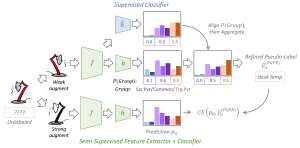 We introduce Universal Semi-Supervised Domain Adaptation, a practical setting where the target domain is partially labeled, and source and target label space may not strictly match. We propose a prior-guided pseudo-label refinement strategy to reduce the reinforcement of common-class bias during training.
We introduce Universal Semi-Supervised Domain Adaptation, a practical setting where the target domain is partially labeled, and source and target label space may not strictly match. We propose a prior-guided pseudo-label refinement strategy to reduce the reinforcement of common-class bias during training.
Rethinking the Role of Pre-Trained Networks in Source-Free Domain Adaptation [poster]
W Zhang, L Shen, CS Foo. International Conference on Computer Vision (ICCV), 2023.
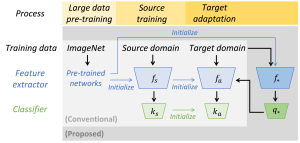
Source training can cause models to overfit to source data distribution and forget target domain knowledge. We propose to integrate pre-trained networks into target adaptation as it has diversified features important for generalization and provides an alternate view of features and classification decisions.
Conditional Contrastive Domain Generalization for Fault Diagnosis
M Ragab, Z Chen, W Zhang, E Eldele, M Wu, CK Kwoh, X Li. IEEE Transactions on Instrumentation and Measurement, 2023.
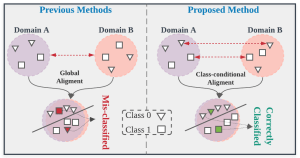 We propose a novel conditional contrastive domain generalization (CCDG) approach for fault diagnosis of rolling machinery, which is able to capture shareable class information and learn environment-independent representation among data collected from different environments.
We propose a novel conditional contrastive domain generalization (CCDG) approach for fault diagnosis of rolling machinery, which is able to capture shareable class information and learn environment-independent representation among data collected from different environments.Domain Generalization via Selective Consistency Regularization for Time Series Classification [poster]
W Zhang, M Ragab, CS Foo. International Conference on Pattern Recognition (ICPR), 2022.
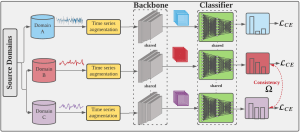
By considering inter-domain relationships between multiple source domains, our proposed method enforces prediction consistency between similar domains through selective regularization of logits. We achieve improved classification performance and model calibration on new target domains.
Few-Shot Adaptation of Pre-Trained Networks for Domain Shift [poster][code]
W Zhang, L Shen, W Zhang, CS Foo. International Joint Conference on Artificial Intelligence (IJCAI), 2022.
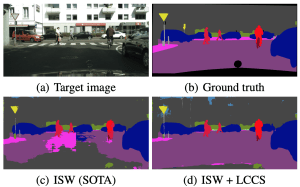
We propose the source-free k-shot adaptation setup to adapt pre-trained networks to the target domain with a small support set. The proposed method modulates batch normalization statistics through a set of linear combination coefficients.
Robust Domain-Free Domain Generalization with Class-Aware Alignment [poster]
W Zhang, M Ragab, R Sagarna. International Conference on Acoustics, Speech, & Signal Processing (ICASSP), 2021.
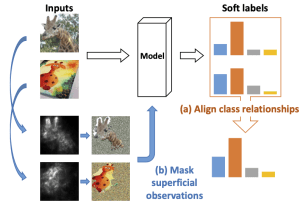
DFDG learns domain-invariant class-discriminative features without the use of source domain labels by (a) aligning class relationships of samples in the same class to the class centroid, and (b) masking superficial observations (e.g. domain-specific backgrounds) from training inputs guided by saliency maps.
POLA: Online Time Series Prediction by Adaptive Learning Rates [poster]
W Zhang. International Conference on Acoustics, Speech, & Signal Processing (ICASSP), 2021.
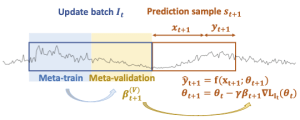
POLA adapts the learning rate of stochastic gradient descent update through a factor valued in [0,1], where the factor is meta-learned with the most recent data batch by assimilating online evaluation.
An Evaluation of Anomaly Detection and Diagnosis in Multivariate Time Series [code]
A Garg, W Zhang, J Samaran, R Savitha, CS Foo. IEEE Transactions on Neural Networks and Learning Systems (TNNLS), 2021.
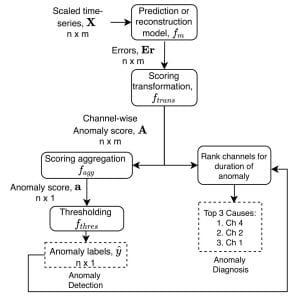
This paper presents a systematic and comprehensive evaluation of unsupervised and semi-supervised deep-learning based methods for anomaly detection and diagnosis on multivariate time series data from cyberphysical systems. Unlike previous works, we vary the model and post-processing of model errors i.e. the scoring functions independently of each other, and compare these variants to state of the art methods.
AURORA: A Unified fRamework fOR Anomaly detection on multivariate time series
L Zhang, W Zhang, MJ McNeil, N Chengwang, DS Matteson, P Bogdanov. Data Mining and Knowledge Discovery (DMKD), 2021.
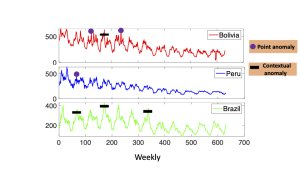
AURORA is a robust offline unsupervised framework for anomaly detection in seasonal multivariate time series. A key innovation in our framework is a general background behavior model that unifies periodicity and long-term trends. We leverage a Ramanujan periodic dictionary and a spline-based dictionary to capture both seasonal and trend patterns.
HALO: Learning to Prune Neural Networks with Shrinkage [code]
S Seto, M T Wells, W Zhang. SIAM International Conference on Data Mining (SDM), 2021.
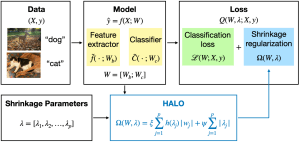
Hierarchical Adaptive Lasso (HALO) is a novel penalty which learns to sparsify weights of a given network via trainable parameters. When used to train over-parametrized networks, the proposed penalty yields small subnetworks with high accuracy without fine-tuning.
CAZSL: Zero-Shot Regression for Pushing Models by Generalizing through Context [code]
W Zhang, S Seto, D K Jha. IEEE/RSJ International Conference on Intelligent Robots and Systems (IROS), 2020.
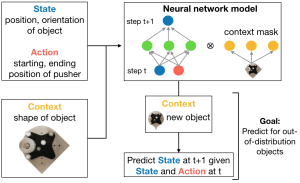
CAZSL utilizes a Siamese network, and regularizes the distance between input context (e.g. mass and shape of object pushed) and context embedding mask to enforce similar objects to have similar intermediate representations. Given a new context, the predicted state is estimated from the masked intermediate representation which incorporates the context.
Learning Periods from Incomplete Multivariate Time Series
L Zhang, A Gorovits, W Zhang, P Bogdanov. IEEE International Conference on Data Mining (ICDM), 2020.
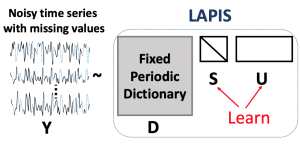
LAPIS encodes incomplete and noisy data as a sparse representation via a Ramanujan periodic dictionary. A key innovation of the proposed framework is that it exploits shared periods across individual time series even when the time series are not correlated or in-phase.
ABACUS: Unsupervised Multivariate Change Detection via Bayesian Source Separation [poster][code]
W Zhang, D Gilbert, D Matteson. SIAM International Conference on Data Mining (SDM), 2019.
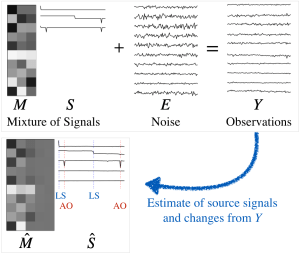
Given observations generated by the linear mixing of signals contaminated by noise, ABACUS estimates the source signals and detect additive outliers and level shifts. The proposed ABACUS method is a Bayesian source separation technique to recover latent signals while also detecting changes in model parameters. Multi-level sparsity achieves both dimension reduction and modeling of signal changes.
Heterogeneous Sensor Data Fusion By Deep Multimodal Encoding
Z Liu, W Zhang, S Lin, T Quek. IEEE Journal of Selected Topics in Signal Processing, 2017.
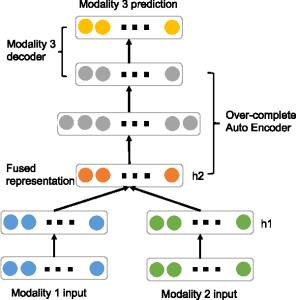
The proposed deep multimodal encoder (DME) improves sensor data compression, missing data imputation, and new modality prediction under multimodal scenarios. While traditional methods capture only the intramodal correlations, DME is able to mine both the intramodal correlations in the initial layers and the enhanced intermodal correlations in the deeper layers.
Pruning and Nonparametric Multiple Change Point Detection [R package]
W Zhang, N James, D Matteson. IEEE ICDM Workshops, 2017.
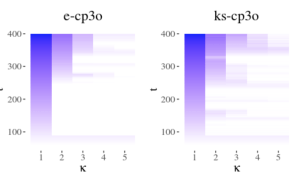
We propose a pruning approach for approximate nonparametric estimation of multiple change points in time series data. This general purpose change point detection procedure ‘cp3o’ applies a pruning routine within a dynamic program to greatly reduce the search space and computational costs.